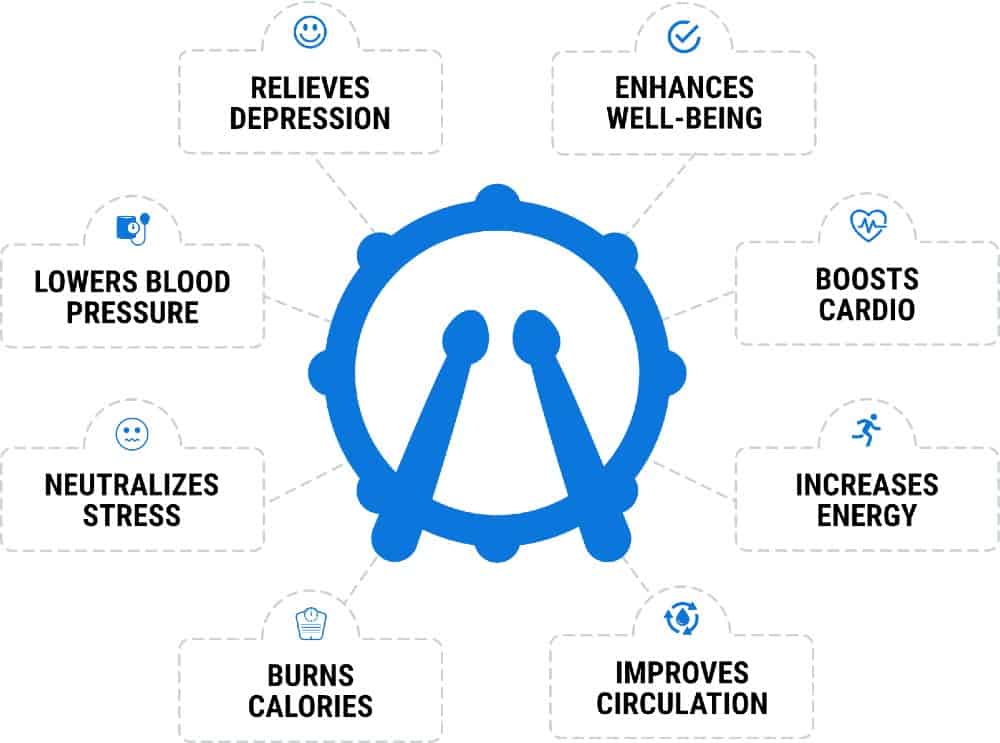Last Updated on June 20, 2021 by Danny
Drumming has been shown to have a positive effect on the drummer’s brains. In fact, drummers who played in a session of 60 minutes were found to demonstrate better cognitive ability than those who did not play drums at all. This is because playing an instrument engages different parts of your brain and stimulates neural activity that may help improve memory or even increase empathy levels. These are just two examples of how drumming can positively affect the human body – it also helps with stress relief and increases focus!
In this blog post, we will discuss how drumming affects the brain by looking at these three topics: physical benefits, cognitive benefits, and emotional benefits, and what kind of benefits you can expect from playing a musical instrument.

The drumming community is a thriving and growing one. There are many mental health benefits of drumming, including stress relief, increased creativity, improved moods, and improved coordination! This article will focus on 9 Health Benefits of Drumming and how it affects the brain.
9 Health Benefits of Drumming
1. Drumming Can Help Relieve Stress

Drumming can help relieve stress by creating an atmosphere where you’re encouraged to share your feelings through songwriting, which has been proven to have therapeutic effects. One study found those who participated in therapy sessions using drums had greater self-esteem levels than those just given standard mental healthcare treatment alone. This is because playing the drums requires a sense of creativity and timing that you may not have needed before.
2. Drumming Can Also Be Used as a Form of Meditation
Drumming has been shown to have measurable effects on the brain and body. Researchers found that drummers activate more parts of their brains than non-drummers, activating both hemispheres. Drumming is a form of meditation because it slows brain waves in some people, increases oxygenation in others, and changes heart rate for all types of individuals.
3. It Helps You Sleep Better
Drumming produces a surge in adrenaline and cortisol, which helps to lower blood pressure. This is due to the increased heart rate that drumming induces in your body. After just 30 minutes of any form of physical activity that raises your heart rate like drumming, you’ll fall asleep faster at night and experience deeper REM cycles during sleep.
4. Playing Drums Makes You Feel Happy and Energized and Reduce Pain and Anxiety
Studies have shown Drumming reduces pain, anxiety, depression, and fatigue while increasing energy levels and positive moods. It also has a deep connection with our nervous system which can be used to manage stress; it is often recommended for people living with chronic pain as well as those recovering from addiction or mental health problems.
The studies found by researchers agree that drummers experience increased feelings of happiness – on average one point higher than non-drummers! So if you’re looking for an alternative activity to improve your mood after a long day, drumming may be just the thing.
In addition to cardio benefits, research has shown that people who play drums are at lower risk of mental illnesses such as anxiety and depression. One study showed that adults over 60 who played an instrument had “a 44% decreased odds ratio” when compared to their peers. Another found that children in grades K-12 who played instruments scored higher on standardized tests were more likely to go to college, and had a lower risk of anxiety than their peers.
Drumming has been shown to increase the electrical activity in your brain, and help with anxiety by releasing serotonin.
Drummers also release endorphins through their hands and feet (Harrison 1968). These are natural pain relievers that increase as tension builds up while playing. It has been shown that people who experience chronic stress have a significant reduction in depression symptoms after taking part in music therapy for just one hour per week over the course of eight weeks (Meng et al 2009).
5. Drums Are an Excellent Way for Children to Learn About Rhythm and Movement While Having Fun

Drumming is also a great activity because it forces the body to move in different ways, which can help with coordination problems. Lastly, drumming has been shown to have positive effects on brain function. Scans of people who play drums show increased blood flow into parts of the right hemisphere that control language processing skills and spatial reasoning abilities – this might be due to hemispheric specialization or general arousal caused by playing music.
Whether these benefits will transfer over after people quit drumming remains unclear but there may be long-term advantages associated with learning such as improved hand-eye coordination and enhanced cerebral development at younger ages.
There are studies that show improved test scores for students who took drums classes over those who did not take them as well as improvements for people with Parkinson’s disease or Alzheimer’s patients after they started playing drums regularly. And even children diagnosed with ADHD showed improvement after just three weeks of drum lessons!
6. Drumming Is a Great Exercise
Drumming strengthens muscles in the arms, hands, fingers, and wrists. It also helps to improve posture and circulation through drum-based activities like hand drums or bongos. Other benefits include increased focus as well as improved coordination skills which lead to better performance on other tasks.
7. Drumming Can Improve Your Mood and Energy Levels
It also increases neuron density and circulation which can improve mood. Drummers have less stress hormones than non-drummers during a stressful event because of how drumming changes body chemistry. It’s never too late to pick up a set of sticks!
8. Playing Drums Regularly Will Increase Hand-eye Coordination
his is because musicians need to see, feel and control the drumsticks at all times. The mental health benefits of playing drums regularly are similar to other instruments that require hand-eye coordination such as golf or tennis. It helps with spatial awareness, patience, and accuracy when it comes to hitting targets on a regular basis. If you want your child to have increased mental ability then go ahead and buy them a musical instrument today!
When music is played by someone who has had training in how rhythm works they will be able to follow patterns easily which will help their memory skills immensely. There’s also evidence suggesting that pounding away on an instrument can release anger so if you’re feeling frustrated give it a try!
9. Drummers Are More Likely to Be Successful

Drumming is an activity that requires the use of both hemispheres of the brain. It stimulates creativity and increases mental focus, which in turn increases attention span as well. Drummers are more likely to be successful because they can multitask with their drumming while completing other tasks at the same time. The ability to attach various rhythms together also makes it easier for them to memorize information better than those who don’t play drums. Memory retention improves and a person’s mood becomes significantly happier when they start playing drums on a regular basis, making you smarter in every way!